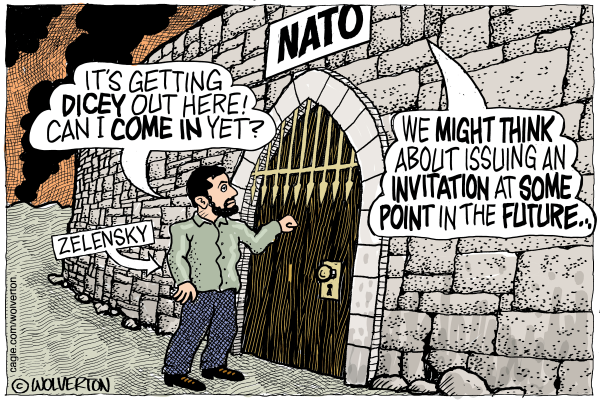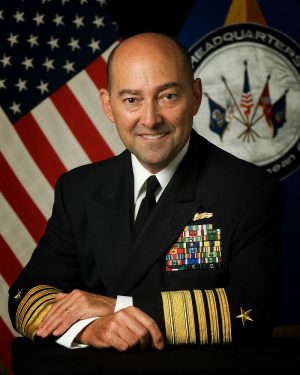
In the wake of Finland's and Sweden's accession to the North Atlantic Treaty Organization, the alliance can take a well-deserved victory lap. I commanded troops from both nations in Afghanistan, and Swedish forces in the Libyan campaign of 2011. The countries have professional and motivated personnel equipped with superb technology systems, from advanced fighter jets to stealthy naval corvettes.
This spells trouble for Russian President Vladimir Putin's military, already much depleted by its misadventure in Ukraine. Both new members have painful historical experiences with Russia. Finland comes with 800 miles of NATO border the Russians will have to plan to defend. If Putin were to invade Estonia, for example, he would now be vulnerable to being flanked through previously neutral Finland, seriously complicating his military calculus.
One aspect of the Sweden-Finland accession gaining little geopolitical attention — when all is focused on Ukraine — is how they will add to NATO's strength in the Arctic. When I visited the Nordic states a decade ago as the alliance's supreme allied commander, their defense chiefs gave me a demonstration of their winter capabilities — their mastery at operating in what our Canadian allies call the High North, above the Arctic circle. I came away deeply impressed.
So, given the new members, what would a coherent NATO strategy for the increasingly important Arctic look like?
Step back and look at the geography. The top of the world is a geopolitical Thunderdome, with the prize of the Arctic Ocean at the center. As global warming removes more and more of the ice cover, access to vital shipping routes and hydrocarbons — oil and gas — will be increasingly crucial for the nations on the front porch of the Arctic Sea. (My Bloomberg Opinion colleague Liam Denning, newly returned from the region, is doing an excellent series of articles and videos on all this.)
Before Sweden and Finland, five such countries were already NATO allies: Canada, Denmark (by virtue of Greenland), Iceland, Norway and the U.S. The two new allies, despite lacking ocean coastlines, are considered Arctic nations. About 15% of Sweden and a third of Finland are within the Arctic Circle: the region known as Lapland. Seven NATO allies now face Russia across the Arctic Ocean.
Before his invasion of Ukraine, Putin was increasing the Arctic capability of Russia's military. More troops, bases and ships were added within the Arctic circle. Given the immense losses he has suffered in Ukraine, this effort will likely slow, giving NATO leverage and an opportunity. The alliance should form a smaller "Arctic Coalition" within NATO to focus in increasing its defensive capability to the north.
This coalition should include a well-staffed center devoted to study and analysis of defensive activities in the harsh conditions. Logically and symbolically, this should be based in the territory of one of the two new allies.
The alliance should also develop a detailed defensive plan for responding to Russian activities in the north. NATO has elaborate defensive plans for dealing with attacks by Russia against the Baltic nations, Turkey and Black Sea countries — it needs a similar war plan for the High North, to be rigorously tested in tabletop exercises and real-world operations.
NATO can also increase its routine surveillance and patrol activities in the region. This should include regular under-ice nuclear submarine patrols by the U.S. and UK; more satellite time devoted to surveilling the polar region; increased overflight by long-range maritime patrol aircraft operating out of Iceland, Canada and Sweden; and ground-based, long-dwell radar systems on Greenland and other northern locations.
Finally, NATO should conduct regular, large-scale combat exercises under realistic conditions. Warfighting is very different at 50 F below freezing. Every relevant NATO combat system — from missiles to rifles to radars to warships — should be evaluated for its efficacy Arctic conditions.
There is a diplomatic aspect to NATO's role in the region as well. The international organization known as the Arctic Council includes all seven NATO members and Russia, as well as observer nations including China. It has provided a forum for planning for shared use of international waters and airspace — a forum where disputes can be heard and compromises reached. Despite immense differences over Ukraine, NATO and Russia must seek to avoid a war at the top of the world. The Arctic Council, like the effective Cold War arms-control agreements, can be part of a diplomatic track to address non-Ukrainian issues.
Adding Sweden and Finland is a very positive step for NATO for many reasons — geography, military capability, advanced technology, European unity. But it also signals much more capability to operate in the Arctic. The alliance should think carefully and act swiftly to capitalize on this northern windfall while Russia's attention is elsewhere.
___
(COMMENT, BELOW)
Stavridis is a Bloomberg columnist. He is a retired U.S. Navy admiral and former supreme allied commander of NATO, and dean emeritus of the Fletcher School of Law and Diplomacy at Tufts University. He is also an operating executive consultant at the Carlyle Group and chairs the board of counselors at McLarty Associates.
Previously:
• 07/11/23 US military's recruiting woes are a national-security crisis
• 06/02/23 Ukraine war may become a proving ground for AI
• 05/16/23 Iran's tanker seizures may bring U.S. convoys back to the Gulf
• 05/08/23 Sudan rescue mission is helping the US Navy prepare for war
• 05/01/23 Ukraine is running out of ammo. So is the US
• 03/10/23 The US military must create a Cyber Force
• 12/07/23 Putin will carpet-bomb Ukraine unless the West acts
• 10/14/22 Putin's campaign of terror from the air is already failing
• 09/08/22 Iran reveals how its naval warfare is changing
• 08/02/22 US needs a global alliance against Russia's cyberattacks
• 06/28/22What to expect from NATO's new strategic concept
• 04/13/22 Nukes? Ukraine war's most potent weapon may be a cell phone
• 01/18/22 Russia is pushing Finland and Sweden toward NATO
• 10/20/21 What Colin Powell taught me about war and optimism
• 09/14/21 Why the U.S. Navy is hunting pirates off Africa
• 07/29/21 Cuba and how Biden can avoid another Mariel boatlift
• 07/01/21 Donald Rumsfeld never gave in
• 02/16/21 Keeping troops in Afghanistan makes America safer
• 08/19/20 Military reasons to celebrate the Israel-UAE deal
• 07/02/20 Taliban bounties would be a new low even for Putin
• 01/02/20 May the 'Space Force' be with you
• 08/02/19 What Iran will do next, and how to stop it
• 05/06/19 The 'Five Eyes' intelligence-sharing alliance should expand, starting with Israel and Japan
• 04/24/19 Sri Lanka attacks mark the birth of terrorism 3.0
• 01/14/19 Iran's tiny navy is trying to revive the Persian Empire
• 06/04/18 US was right to give China's navy the boot
• 06/04/18 Big winner of Colombia's election is the US
• 05/17/18 Great power politics is back as U.S. aims at Russia with resurrected Navy fleet
• 03/20/18 Fake advice for Putin's fake win


 Contact The Editor
Contact The Editor
 Articles By This Author
Articles By This Author